外研版小学英语(三起)五年级上册Module5单词词组解析
外研版三起英语五年级上册:全册知识归纳【精品】
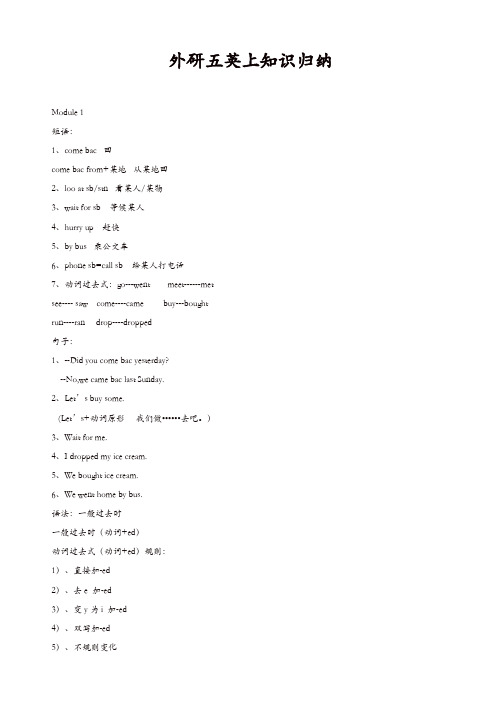
外研五英上知识归纳Module 1短语:1、come bac 回come bac from+某地从某地回2、loo at sb/stn 看某人/某物3、wait for sb 等候某人4、hurry up 赶快5、by bus 乘公交车6、phone sb=call sb 给某人打电话7、动词过去式:go---went meet------metsee---- saw come----came buy---boughtrun----ran drop----dropped句子:1、--Did you come bac yesterday?--No,we came bac last Sunday.2、Let’s buy some.(Let’s+动词原形我们做••••••去吧。
)3、Wait for me.4、I dropped my ice cream.5、We bought ice cream.6、We went home by bus.语法:一般过去时一般过去时(动词+ed)动词过去式(动词+ed)规则:1)、直接加-ed2)、去e 加-ed3)、变y为i 加-ed4)、双写加-ed5)、不规则变化肯定句:Sb +动词ed.否定句:Sb +didn’t+动词原形.一般疑问句:Did+sb +动词原形?Yes,sb did./No,sb didn’t.Module 2短语:1、buy some fruit 买一些水果2、mae a shopping list 制定一个购物清单3、also也,放句中too也,放句末4、some“一些”,接可数名词复数或不可数名词,用在肯定句中any“一些”,接可数名词复数或不可数名词,用在否定句中I have apples.I don’t have apples.Do you have apples?5、half a ilo 半公斤6、a lot of=lots of 许多接可数名词复数或不可数名词7、over there 那边8、动词过去式:buy---bought eat---atedrin---dran句子:1、--What did you buy?---I bought some apples.2、--How many bananas did you buy?--We didn’t buy any bananas.注:How many +可数名词复数+一般疑问句?3、--How much cheese did you buy?--Half a ilo.注:How much +不可数名词+一般疑问句?回答用half a ilo / 数词+ilo(s) / 数词+bottle(s)语法:特殊疑问句特殊疑问句构成:特殊疑问词+一般疑问句?回答时,根据具体情况回答。
外研社(三年级起)小学英语五年级上册 单词表(含音标)

外研社小学英语(三年级起点) 五年级上册单词表五年级上册单词表Module 1met[met]above[əˈbʌv]ground[graʊnd]those[ðəʊz]ice cream [ais kri:m]us[əs]finish['finiʃ]wait[weit]hurry ['hʌri]hurry up[ˈhʌri ʌp]dropped[drɔpt]send[send]email['i:meil]ran [ræn]love[lʌv]Module 2list [list]er[ɜ:(r)] ]need [ni:d]first[fɜ:st]can [kæn]lost[lɔst ]how much[hau mʌtʃ]cheese[tʃi:z]any ['eni]use[ju:s]over there[ˈəuvə ðɛə]bottle['bɒtl]half[hɑ:f]kilo ['ki:ləʊ] a lot of [ə lɔt ɔv]Module 3 weekend[wi:k'end] place[pleis] British [ˈbritiʃ] museum[mjuˈzi:əm] how [haʊ]best[best]took [tʊk]trip[trip] along [əˈlɔŋ]river ['rivə (r)] hour['aʊə (r)] twenty[ˈtwenti] minute['minit] of [əv]wall[wɔ:l] arrive [ə'raiv]for[fə(r)] mountain ['maʊntən] with[wið]plant [plɑ:nt]Module 4 pair[peə(r)] shorts[ʃɔ:ts] argue ['ɑ:ɡju:] matter ['mætə (r)] took[tʊk]wear [weə (r)] sports [spɔ:ts] hey [hei]Module 5 nineteen [nainˈti:n]crayon ['kreiən]fifteen [fifˈti:n]begin[bi'ɡin] give out [ɡiv aut] all right[ɔ:l rait] thirteen [θɜ:'ti:n] fourteen[fɔ:ˈti:n] sixteen[siksˈti:n] seventeen [sevnˈti:n] eighteen [eiˈti:n]floor[flɔ:(r)]forty ['fɔ:ti] number[ˈnʌmbə(r)] thirty ['θɜ:ti]fifty['fifti]sixty['siksti] seventy[ˈsevnti]eighty['eiti]ninety ['nainti] happily [ˈhæpili]many['meni]Module 6 well[wel]team [ti:m]really[ˈri:əli] good at[ɡud æt]catch[kætʃ] goalkeeper [ˈgəʊlki:pə(r)] think[θiŋk] fantastic [fænˈtæstik] fan[fæn]past[pɑ:st]swan [swɒn]slow[sləʊ] healthy [ˈhelθi]Module 7a lot [ə lɔt]useful[ˈju:sfl]show[ʃəʊ] presenter [priˈzentə(r)] blind[blaind]deaf[def]hear [hiə(r)]her[hə(r)]fire['faiə(r)] firefighter [ˈfaiəfaitə(r)] hot dog[hɔt dɔg]*sausage[ˈsɔsidʒ] kind[kaind]Module 8 time[taim]school [sku:l]start[stɑ:t]past[pɑ:st]late[leit] exercise['eksəsaiz] playground ['pleiɡraʊnd] before[biˈfɔ:]join[dʒɔɪn] skipping rope [skɪpɪŋ] [rəʊp] coffee [ˈkɔfi]tea [ti:]always['ɔ:lweiz]bell[bel]rang[ræŋ]into['intə]Module 9 feel[fi:l]bored[bɔ:d]sad[sæd]woof[wʊf]miss[mis]angry ['æŋɡri]ill [il]told [təʊld]better['betə(r)]farm[fɑ:m]tired['taiəd]won [wʌn]ruler [ˈru:lə(r)]smell [smel]Module 10 kitchen ['kitʃin]toilet['tɔilət]room [ru:m] living room [ˈliviŋ ru:m] hide-and-seek [haid nˈsi:k] now[naʊ]last[lɑ:st]hide[haid]sofa ['səʊfə]shout [ʃaʊt]grass [ɡrɑ:s]baby['beibi] dangerous[ˈdeindʒərəs]五年级上册单词表表(meet过去式)碰上,遇见在.....上方,在.....之上地面那些冰激凌(宾格)我们吃完,喝完,用尽等待,等候赶紧,匆忙赶紧,赶快(drop过去式)(无意中)使掉落发送,寄电子邮件(run的过去式) 跑爱你的清单哦,嗯,呃需要首先,第一,最先的,第1(次)的可以(lose的过去式)丢失多少(用于不可数名词)奶酪一些,一点,若干使用在那边瓶子;一瓶的容量一半千克,公斤许多的周末地方英国的,英国人的,英国人博物馆如何,怎样最(take的过去式)搭乘,乘坐(交通工具)旅行,旅程沿着河,江小时二十分钟关于......的,表明......的墙,城墙到达达,计山拥有,具有植物一套,一双,一副(常复)短裤争论,争吵问题,麻烦(take的过去式)拿(走),取(走)穿体育运动的,体育运动用的嘿,喂十九蜡笔十五开始分发好,行十三十四十六十七十八地面,地板四十数字三十五十六十七十八十九十幸福地,愉快地许多,很多好,熟练地运动队,球队很,非常擅长抓住,接住守门员想,认为极好的狂热仰慕者,迷过去(swim的过去式)游泳慢的健康的许多,大量有用的(电视或广播)节目(电视或广播节目的)主持人 失明的,瞎的失聪的,聋的听到(宾格)她火灾,失火消防队员热狗香肠友好的,善意的,体贴的时刻,时候,时间上课时间,上学时间开始,发生晚于,过(几点)迟到的运动,锻炼操场在……之前加入,参加跳绳咖啡茶总是,一直钟,铃(ring过去式)鸣,响进入......里面感觉,觉得厌烦的,厌倦的伤心的,难过的(狗发出的)吠声想念生气的,愤怒的有病的,不健康的(tell的过去式)告诉痊愈的,恢复健康的农场累的,疲劳的(win的过去式)赢,获胜直尺闻出,嗅出厨房厕所,卫生间,房间起居室,客厅捉迷藏好,哦最后躲,躲藏沙发呼喊,大叫草,草地婴儿危险的。
外研版小学英语(三起)五年级上册Module5Unit2基础知识解析

外研版小学英语(三起)五年级上册Module5Unit2基础知识解析Module5nit2基础知识解析Module5Unit2 There are forty.有40个。
1.Listen and chant.听一听,并说唱。
Numbers are having a party.数字们正在举办一场聚会。
Twenty,thirty,forty,fifty,sixty,seventy,eighty and ninety.二十,三十,四十,五十,六十,七十,八十和九十。
All of them are dancing happily.它们都在愉快地(欢快地)跳舞。
2.Listen and read.听一听,读一读。
——How many pupils are there in your class,Lingling ? 你们班级里有多少名学生,玲玲?——There are fourteen.有14名。
——Fourteen ?14名?——Oh sorry.There are forty.哦,对不起。
有40名。
——Oh,there are so many !哦,有那么多!3.Read and say.读一读,说一说。
A :There are seventy pupils in Lake School.在湖泊学校有70个学生。
答案链接:A :There are thirty boys in Lake School.B :There are forty boys in Park School. A:There are forty girls in Lake School. B :There are fifty girls in Park School.A :There are twenty computers in Lake School.B :There are thirty computers in Park School.Ten big lions at the zoo.10只大狮子在动物园里。
外研版小学英语(三起)五年级上册单词表(含音标)
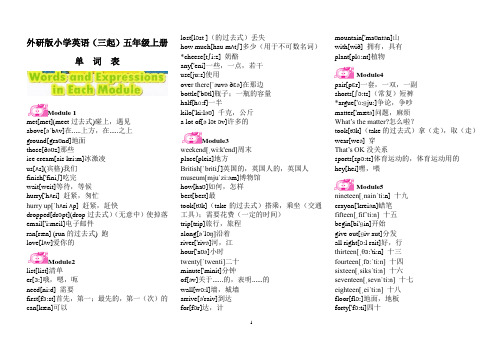
外研版小学英语(三起)五年级上册单词表Module 1met[met](meet过去式)碰上,遇见above[əˈbʌv]在.....上方,在.....之上ground[graʊnd]地面those[ðəʊz]那些ice cream[ais kri:m]冰激凌us[ʌs](宾格)我们finish['finiʃ]吃完wait[weit]等待,等候hurry['hʌri] 赶紧,匆忙hurry up[ˈhʌri ʌp] 赶紧,赶快dropped[drɔpt](drop过去式)(无意中)使掉落email['i:meil]电子邮件ran[ræn] (run的过去式) 跑love[lʌv]爱你的Module2list[list]清单er[ɜ:]哦,嗯,呃need[ni:d] 需要first[fɜ:st]首先,第一;最先的,第一(次)的can[kæn]可以lost[lɔst ](的过去式)丢失how much[hau mʌtʃ]多少(用于不可数名词)*cheese[tʃi:z] 奶酪any['eni]一些,一点,若干use[ju:s]使用ove r there[ˈəuvə ðɛə]在那边bottle['bɒtl]瓶子;一瓶的容量half[hɑ:f]一半kilo['ki:ləʊ] 千克,公斤a lot of[ə lɔt ɔv]许多的Module3weekend[ˌwi:k'end]周末place[pleis]地方British[ˈbritiʃ]英国的,英国人的,英国人museum[mjuˈzi:əm]博物馆how[haʊ]如何,怎样best[best]最took[tʊk](take的过去式)搭乘,乘坐(交通工具);需要花费(一定的时间)trip[trip]旅行,旅程along[əˈlɔŋ]沿着river['rivə]河,江hour['aʊə]小时twenty[ˈtwenti]二十minute['minit]分钟of[əv]关于......的,表明......的wall[wɔ:l]墙,城墙arrive[ə'raiv]到达for[fɔr]达,计mountain['maʊntən]山with[wið] 拥有,具有plant[plɑ:nt]植物Module4pair[pɛr]一套,一双,一副shorts[ʃɔ:ts](常复)短裤*argue['ɑ:ɡju:]争论,争吵matter['mætə]问题,麻烦What’s the matter?怎么啦?took[tʊk](take的过去式)拿(走),取(走)wear[weə] 穿That’s OK没关系sports[spɔ:ts]体育运动的,体育运动用的hey[hei]嘿,喂Module5nineteen[ˌnainˈti:n] 十九crayon['kreiən]蜡笔fifteen[ˌfifˈti:n] 十五begin[bi'ɡin]开始give out[ɡiv aut]分发all right[ɔ:l rait]好,行thirteen[ˌθɜ:'ti:n] 十三fourteen[ˌfɔ:ˈti:n] 十四sixteen[ˌsiksˈti:n]十六seventeen[ˌsevnˈti:n] 十七eighteen[ˌeiˈti:n] 十八floor[flɔ:]地面,地板forty['fɔ:ti]四十number[ˈnʌmbə]数字thirty['θɜ:ti]三十fifty['fifti]五十sixty['siksti]六十seventy[ˈsevnti]七十eighty['eiti]八十ninety['nainti]九十happily[ˈhæpili]幸福地,愉快地many['meni]许多,很多Module6well[wel] 好,熟练地team[ti:m]运动队,球队really[ˈri:əli]很,非常good at[ɡud æt]擅长catch[kætʃ]抓住,接住*goalkeeper[ˈgəʊlki:pə]守门员think[θiŋk]想,认为fantastic[fænˈtæstik]极好的fan[fæn]狂热仰慕者,迷past[pɑ:st]过去swan[swɒn](swim的过去式)游泳slow[sləʊ]慢的healthy[ˈhelθi]健康的Module7a lot[ə lɔt]许多,大量useful[ˈju:sfl]有用的show[ʃəʊ](电视或广播)节目*presenter[priˈzentə](电视或广播节目的)主持人deaf[def]失明的,瞎的dear[diə]失聪的,聋的hear[hiə]听到her[hə](宾格)她fire['faiə]火灾,失火*firefighter[ˈfaiəfaitə]消防队员hot dog[hɔt dɔg]热狗*sausage[ˈsɔsidʒ]香肠kind[kaind]友好的,善意的,体贴的Module8time[taim]时刻,时候,时间school[sku:l]上课时间,上学时间start[stɑ:t]开始,发生past[pɑ:st]晚于,过(几点)late[leit]迟到的go to bed上床睡觉exercise['eksəsaiz] 运动,锻炼playground['pleiɡraʊnd] 操场before[biˈfɔ:] 在……之前join[dェɔin]加入,参加Skipping rope 跳绳coffee[ˈkɔfi]咖啡tea[ti:]茶always['ɔ:lweiz]总是,一直bell[bel]钟,铃rang[ræŋ](ring过去式)鸣,响into['intə]进入......里面Module9feel[fi:l] 感觉,觉得bored 厌烦的,厌倦的sad[sæd] 伤心的,难过的woof[wuf](狗发出的)吠声miss[mis] 想念angry['æŋɡri] 生气的,愤怒的ill[il]有病的,不健康的told[təʊld](tell的过去式)告诉better['betə]痊愈的,恢复健康的farm[fɑ:m] 农场tired['taiəd] 累的,疲劳的won[wʌn](win的过去式)赢,获胜ruler[ˈru:lə]直尺smell[smel]闻出,嗅出Module10kitchen['kitʃin]厨房toilet['tɔilət]厕所,卫生间,room[ru:m]房间living room[ˈliviŋ ru:m]起居室,客厅*hide-and-seek[ˌhaid n ˈsi:k]捉迷藏now[naʊ] 好,哦last[lɑ:st] 最后hide[haid] 躲,躲藏sofa['səʊfə] 沙发shout[ʃaʊt] 呼喊,大叫grass[ɡrɑ:s]草,草地baby['beibi]婴儿dangerous[ˈdeindʒərəs]危险的。
外研版(三起)-英语-五年级上册-英语外研版五年级上 Module 5 Unit 1 教材同步讲解 教案(词汇)

Module 5Unit l There are only nineteen crayons.只有19支蜡笔。
Listen and chant.听一听并说唱。
(教材第26页)课文全译How many faces car you see? 你们能看到多少张脸?Fifteen faces we Can see.我们能看到l5张脸。
How many faces can you see? 你们能看到多少张脸?Twenty faces we can see.我们能看到20张脸。
fifteen l5 twenty 20Listen.read and act out.听一听,读一读并表演。
(教材第26~27页) 情景详解英语描述:In class,Ms Smart asks Sam to give out the crayons.汉语描述:在课堂上,斯玛特女士让萨姆发蜡笔。
词汇全解必会begin /bi'gin/ v.(动词)开始be·'gin /bi·'gin/beginningbeganstart开始end结束beginner见(名词)初学者begin at…从……开始,begin with…以……开始Let’s begin.让我们开始吧give out分发The teacher asks Ann give out to the pens.老师让安把钢笔发下去。
crayon /'kreiən/ n.(名词)蜡笔字母组合ay在crayon中发/ei/。
'cray·on /'krei·ən/crayonscrayon drawing蜡笔画pen钢笔,paintbrush画笔,pencil铅笔I have some crayons.我有一些蜡笔。
all right好;行OKthirteen /'θə:'ti:n/ num.(数词)十三字母组合ir在thirteen中发/ə:/。
外研版小学英语5年级上册Module5精选课件重点解析
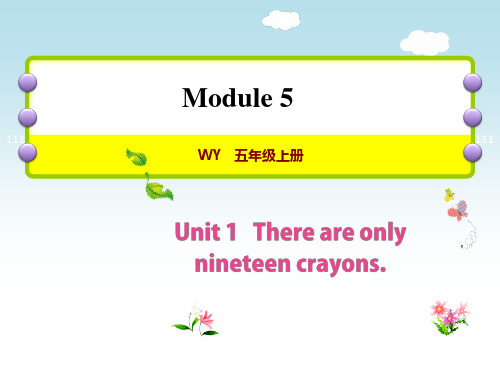
讲解
many /'meni/ adj. 许多 例句:How many faces can you see?你们能看见多少张脸? 短语:how many 多少
同义词:much 反义词:few 其他意义:the many(pron.)大多数人 加法记忆法:m + any(一些)=many( 许多)
我们能看到十五支钢笔。 联想记忆法:five 五 fifty 五十 短语: fifteen crayons 15 根蜡笔
讲解
知识点 2 Twenty faces we can see. 我们能看到二 十张脸。
本句将宾语前置,强调宾语的内容, 往往在歌曲或韵律诗里为达到押韵 效果而采用这种方式,此句可写成: We can see twenty faces.
联想记忆法: pen 钢笔,pencil 铅笔
讲解
知识点 5 thirteen /ˌθɜː'tiːn/ num. 十三 例句: I see thirteen bears.
我看见了十三只熊。
讲解
知识点 6 fourteen /ˌfɔː'tiːn/ num. 十四
例句: I have fourteen pens.我有14 支钢笔。
本节课我们学习了以下知识,请同学们一定加 强巩固,以便能和同学们进行灵活交流哦! 重点词汇:crayon, begin, floor 重点句式:Please give out the crayons.
Twenty faces we can see.
Module 5
11111111111111111111111111111111111111111111111111111111111111111111111111111
外研版英语五年级上册全册单词表
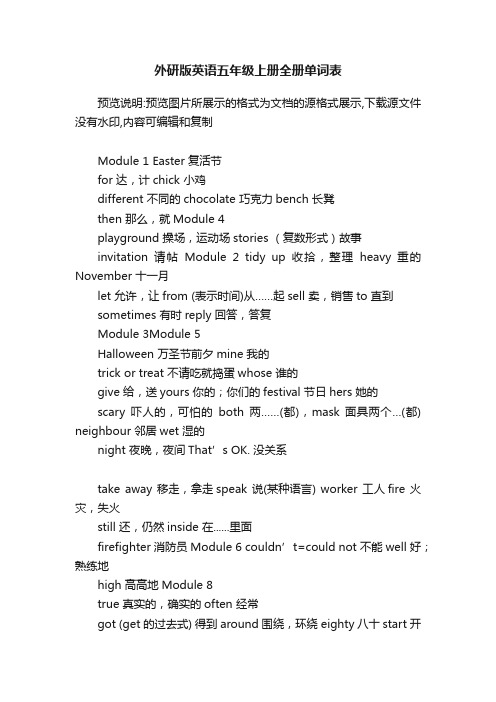
外研版英语五年级上册全册单词表预览说明:预览图片所展示的格式为文档的源格式展示,下载源文件没有水印,内容可编辑和复制Module 1 Easter 复活节for 达,计chick 小鸡different 不同的chocolate 巧克力bench 长凳then 那么,就Module 4playground 操场,运动场stories (复数形式)故事invitation 请帖Module 2 tidy up 收拾,整理heavy 重的November 十一月let 允许,让from (表示时间)从……起sell 卖,销售to 直到sometimes 有时reply 回答,答复Module 3Module 5Halloween 万圣节前夕mine 我的trick or treat 不请吃就捣蛋whose 谁的give 给,送yours 你的;你们的festival 节日hers 她的scary 吓人的,可怕的both 两……(都),mask 面具两个…(都) neighbour 邻居wet 湿的night 夜晚,夜间That’s OK. 没关系take away 移走,拿走speak 说(某种语言) worker 工人fire 火灾,失火still 还,仍然inside 在......里面firefighter 消防员Module 6 couldn’t=could not 不能well 好;熟练地high 高高地Module 8true 真实的,确实的often 经常got (get的过去式) 得到around 围绕,环绕eighty 八十start 开始point 分数line 行,排,列fan 狂热爱好者,迷half 一半seventy 七十past 晚于,过(几点)sixty 六十miss 想念study 学习Module 7 open 开着的useful 有用的wall 墙show (电视或广播)节目have fun 玩得开心presenter (电视或广播节目的) break 课间休息主持人blind 失明的,瞎的could (can的过去式) 能Module 9nothing 没有事情,没有东西think 思考;想,觉得drank (drink 的过去式) 喝,饮Module 10should 应该go to bed 上床睡觉shouldn’t = should not 不应该take down 取下,拿下clean 干净的rule 规则,规章kind 友好的,善意的,体贴的。
外研版小学3起 五年级上册英语精品教学课件 Module5 Unit 2
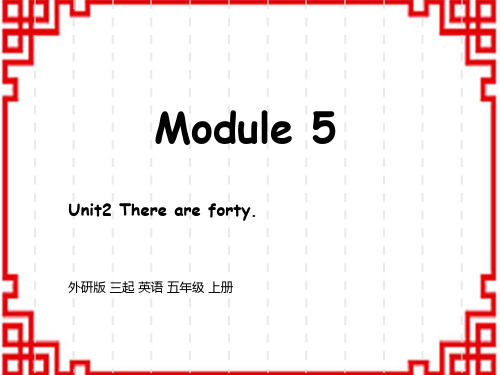
There be 句型& How many pupils数ar词e there in your class?
1 There are forty.
2
is +可数名词单数或不可数名词 There
are+可数名词复数
3
数词:twenty, thirty, forty, fifty, sixty, seventy, eighty, ninety, hundred
eighty sixty sevent
y
Listen and answer
How many pupils are there in Lingling’s class? There are forty.
te 十四 en
ty 四十
Listen and read
How many pupils are there in your class?
90 pupils 40 boys 50 girls 30 computers
There are seventy pupils in Lake School.
There are ninety pupils in Park School.
Lake School
70 pupils 30 boys 40 girls 20 computers
Listen to the song
How many windows are there in the classroom?
How many children are there in our class?
How many numbers can you see?
Listen and chant
2. How many time is there in a class?
外研版五年级英语上册Module5_6知识归纳素材优质.doc
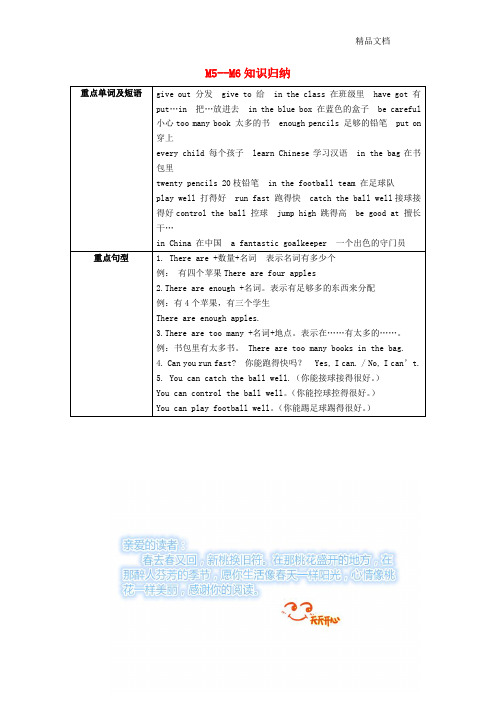
精品文档M5--M6知识归纳重点单词及短语give out 分发 give to 给 in the class 在班级里 have got 有put…in 把…放进去 in the blue box 在蓝色的盒子 be careful小心too many book 太多的书 enough pencils 足够的铅笔 put on穿上every child 每个孩子 learn Chinese学习汉语 in the bag在书包里twenty pencils 20枝铅笔 in the football team 在足球队play well 打得好 run fast 跑得快 catch the ball well接球接得好control the ball 控球 jump high 跳得高 be good at 擅长干…in China 在中国 a fantastic goalkeeper 一个出色的守门员重点句型 1. There are +数量+名词表示名词有多少个例:有四个苹果There are four apples2.There are enough +名词。
表示有足够多的东西来分配例:有4个苹果,有三个学生There are enough apples.3.There are too many +名词+地点。
表示在……有太多的……。
例:书包里有太多书。
There are too many books in the bag.4. Can you run fast? 你能跑得快吗? Yes, I can. / No, I can’t.5. You can catch the ball well.(你能接球接得很好。
)You can control the ball well。
(你能控球控得很好。
)You can play football well。
(你能踢足球踢得很好。
)1、Thank you very much for taking me with you on that splendid outing to London. It was the first time that I had seenthe Tower or any of the other famous sights. If I'd gone alone, I couldn't have seen nearly as much, because I wouldn'thave known my way about.The weather was splendid on that day, which I thought was rare. I still remember some peopletold me that in Britain there was weather and no climate. During the same day, it might snow in the morning, rainat noon, shine in the afternoon and be windy before the night falls. So I think I was lucky。
外研版(三起)五年级英语上册 Module 5 知识点清单
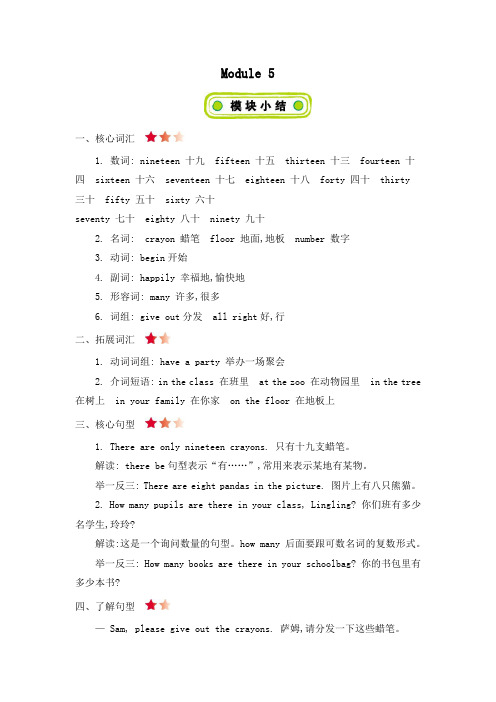
Module 5一、核心词汇1. 数词: nineteen 十九fifteen 十五thirteen 十三fourteen 十四sixteen 十六seventeen 十七eighteen 十八forty 四十thirty 三十fifty 五十sixty 六十seventy 七十eighty 八十ninety 九十2. 名词: crayon 蜡笔floor 地面,地板number 数字3. 动词: begin开始4. 副词: happily 幸福地,愉快地5. 形容词: many 许多,很多6. 词组: give out分发all right好,行二、拓展词汇1. 动词词组: have a party 举办一场聚会2. 介词短语: in the class 在班里at the zoo 在动物园里in the tree 在树上in your family 在你家on the floor 在地板上三、核心句型1. There are only nineteen crayons. 只有十九支蜡笔。
解读: there be句型表示“有……”,常用来表示某地有某物。
举一反三: There are eight pandas in the picture. 图片上有八只熊猫。
2. How many pupils are there in your class, Lingling? 你们班有多少名学生,玲玲?解读:这是一个询问数量的句型。
how many 后面要跟可数名词的复数形式。
举一反三: How many books are there in your schoolbag? 你的书包里有多少本书?四、了解句型— Sam, please give out the crayons. 萨姆,请分发一下这些蜡笔。
— All right. 好的。
解读:这是一个请求别人做某事的句子及其回答。
外研社五年级上知识点Module5
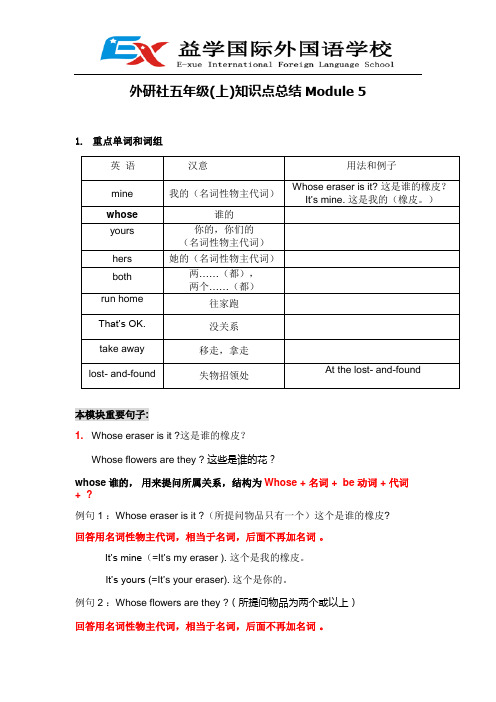
外研社五年级(上)知识点总结Module 51.重点单词和词组本模块重要句子:1. Whose eraser is it ?这是谁的橡皮?Whose flowers are they ? 这些是谁的花?whose谁的,用来提问所属关系,结构为Whose + 名词 + be 动词 + 代词+ ?例句1 :Whose eraser is it ?(所提问物品只有一个)这个是谁的橡皮?回答用名词性物主代词,相当于名词,后面不再加名词。
It’s mine(=It’s my eraser ). 这个是我的橡皮。
It’s yours (=It’s your eraser). 这个是你的。
例句2 :Whose flowers are they ?(所提问物品为两个或以上)回答用名词性物主代词,相当于名词,后面不再加名词。
They’re mine(=They’re my flowers ). 这些是我的花。
They’re yours (=They’re your flowers). 这些是你的花。
请熟记下列表格:3. What’s the matter? 怎么了?/发生什么了?这是一个固定的常用表达4. Sam wants to wear my T-shirt.Sam想穿我的T恤。
want to do sth 想要做某事5. both表复数含义,be动词要用复数形式。
例句: Both your red T-shirts are there. 你们的两件红T恤都在那。
both your T-shirts = both of your T-shirts6. I lost my hat. 我弄丢了我的帽子。
(lose—lost 遗失,丢失)7. It’s raining. 下雨了。
(该句为正在进行时。
)8. The children are running home. 孩子们正在往家跑。
(该句为正在进行时,结构为:主语 +be +动词ing+其他)9. Tom is laughing. Tom 正在大笑。
外研版小学英语(三起)五年级上册Module5Unit1基础知识解析
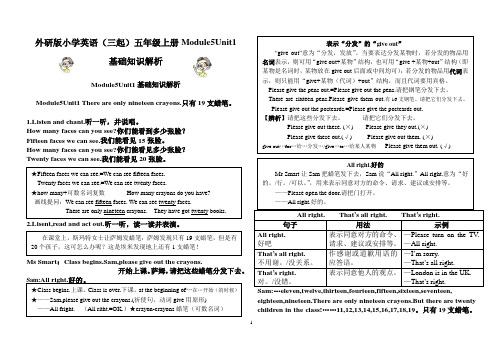
外研版小学英语(三起)五年级上册Module5Unit1基础知识解析Module5Unit1基础知识解析Module5Unit1 There are only nineteen crayons.只有19支蜡笔。
1.Listen and chant.听一听,并说唱。
How many faces can you see?你们能看到多少张脸? Fifteen faces we can see.我们能看见15张脸。
How many faces can you see?你们能看见多少张脸? Twenty faces we can see.我们能看见20张脸。
2.Lisent,read and act out.听一听,读一读并表演。
Ms Smart :Class begins.Sam,please give out the crayons.开始上课。
萨姆,请把这些蜡笔分发下去。
eighteen,nineteen.There are only nineteen crayons.But there are twenty children in the class!……11,12,13,14,15,16,17,18,19。
只有19支蜡笔。
但是班里有20个孩子!Ms Smart:I bought twenty yesterday.Did I lose one?昨天我买了20支。
我弄丢了一支吗?Amy:No,you didn ’t.There ’s one on the floor!不,你没有弄丢。
地板上有一支!Amy:Oh no!哦不!Sam:Oh,now there are twenty-one crayons !哦,现在有21支蜡笔了!3.Listen and say.听一听,说一说。
There are only nineteen crayons.But there are twenty children in the class.只有19支蜡笔。
外研版小学英语(三起)五年级上册单词表(含音标)
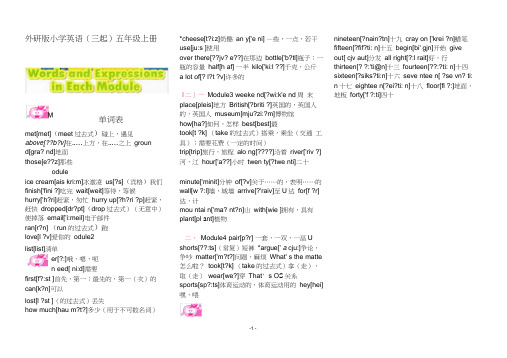
外研版小学英语(三起)五年级上册单词表met[met](meet过去式)碰上,遇见above[??b?v]在..…上方,在..…之上ground[gra? nd]地面those[e??z]那些ice cream[ais kri:m]冰激凌us[?s](宾格)我们finish['fini ?]吃完wait[weit]等待,等候hurry['h?ri]赶紧,匆忙hurry up[?h?ri ?p]赶紧,赶快dropped[dr?pt](drop过去式)(无意中)使掉落email['i:meil]电子邮件ran[r?n] (run的过去式)跑love[l ?v]爱你的odule2list[list]清单er[?:]哦,嗯,呃n eed[ ni:d]需要first[f?:st ]首先,第一;最先的,第一(次)的can[k?n]可以lost[l ?st ](的过去式)丢失how much[hau m?t?]多少(用于不可数名词)*cheese[t?i:z]奶酪an y['e ni] —些,一点,若干use[ju:s ]使用over there[??jv? e??]在那边bottle['b?tl]瓶子;一瓶的容量half[h af] 一半kilo['ki:l ??]千克,公斤a lot of[? l?t ?v]许多的l二丿亠Module3 weeke nd[?wi:k'e nd周末place[pleis]地方British[?briti ?]英国的,英国人的,英国人museum[mju?zi:?m]博物馆how[ha?]如何,怎样best[best]最took[t ?k] (take的过去式)搭乘,乘坐(交通工具);需要花费(一定的时间)trip[trip]旅行,旅程alo ng[????]沿着river['riv ?]河,江hour['a??]小时twen ty[?twe nti]二十minute['minit]分钟of[?v]关于……的,表明……的wall[w ?:l]墙,城墙arrive[?'raiv]至U达for[f ?r]达,计mou ntai n['ma? nt?n]山with[wie ]拥有,具有plant[pl a nt]植物二,Module4 pair[p?r] 一套,一双,一畐Ushorts[??:ts](常复)短裤*argue[' a cju:]争论,争吵matter['m?t?]问题,麻烦What' s the matte怎么啦?took[t?k] (take的过去式)拿(走),取(走)wear[we?]穿That' s O S关系sports[sp?:ts]体育运动的,体育运动用的hey[hei]嘿,喂nineteen[?nain?tn]十九cray on ['krei ?n]蜡笔fifteen[?fif?ti: n]十五begin[bi' gjn]开始giveout[ cjv aut]分发all right[?:l rait]好,行thirteen[? ?:'ti@n]十三fourteen[??:?ti: n]十四sixteen[?siks?ti:n]十六seve ntee n[ ?se vn? ti:n十七eightee n[?ei?ti: n]十八floor[fl ?:]地面,地板forty['f ?:ti]四十odule 1number[?r?mb?]数字thirty]' ?:ti$三十fifty['fifti]五十sixty['siksti]六十seve nty[?se vn ti七十eighty['eiti]八十ninety['nainti]九十happily[?h?pili]幸福地,愉快地ma ny['me ni]许多,很多well[wel]好,熟练地team[ti:m]运动队,球队really[?ri:?li]很,非常good at[ gjd ?t]擅长catch[k?t ?]抓住,接住*goalkeeper[?g??lki:p ?守门员think[ 9 i想],认为fantastic[f?n?t?stik]极好的fan[f?n]狂热仰慕者,迷past[p a st]过去swan[sw?n] (swim的过去式)游泳slow[sl??]慢的healthy[?hel 健康的a lot[? l?t]许多,大量useful[?ju:sfl]有用的show[???](电视或广播)节目*presenter[pri?zent?(电视或广播节目的)主持人deaf[def]失明的,瞎的dear[di?]失聪的,聋的hear[hi?]听到her[h?](宾格)她fire['fai ?]火灾,失火*firefighter[?fai? fait?]消防队员hot dog[h?t d?g]热狗*sausage[??sid?]香肠kind[kaind]友好的,善意的,体贴的time[taim]时刻,时候,时间school[sku:l]上课时间,上学时间start[st at]开始,发生past[p a st]晚于,过(几点)late[leit]迟到的go to bed上床睡觉exercise['eks?saiz]运动,锻炼playground['plei q a?nd]操场before[bi?f?:]在之前join[d ? ?in]加入,参加Skipping rope 跳绳coffee[?k?fi]咖啡tea[ti:]茶always['?:lweiz]总是,一直bell[bel]钟,铃rang[r??](ring 过去式)鸣,响into['int ?进入里面Module9 feel[fi:l]感觉,觉得bored厌烦的,厌倦的sad[s?d]伤心的,难过的woof[wuf](狗发出的)吠声miss[mis]想念angry['?? cfi]生气的,愤怒的ill[il]有病的,不健康的told[t??ld](tell的过去式)告诉better['bet?]痊愈的,恢复健康的farm[f a m]农场tired['tai?d]累的,疲劳的won[w?n](win的过去式)赢,获胜ruler[?ru:l?直尺smell[smel ]闻出,嗅出kitche n[ 'kit ?in]厨房toilet['t?il?t]厕所,卫生间,room[ru:m]房间living room[?livi? ru:m]起居室,客厅*hide-a nd-seek[?haid n ?si:k捉迷藏now[na?]好,哦last[l a st]最后hide[haid]躲,躲藏sofa['s??f?]沙发shout[?a?t]呼喊,大叫grass© a s ]草,草地baby['beibi]婴儿dan gerous[?dei nd?r?s]危险的。
外研版小学英语(三起)五年级上册单词表(含音标)

外研版小学英语(三起)五年级上册单词表Module 1met[met](meet过去式)碰上,遇见above[??b?v]在.....上方,在.....之上ground[gra?nd]地面those[e??z]那些ice cream[ais kri:m]冰激凌us[?s](宾格)我们finish['fini?]吃完wait[weit]等待,等候hurry['h?ri] 赶紧,匆忙hurry up[?h?ri ?p] 赶紧,赶快dropped[dr?pt](drop过去式)(无意中)使掉落email['i:meil]电子邮件ran[r?n] (run的过去式) 跑love[l?v]爱你的Module2list[list]清单er[?:]哦,嗯,呃need[ni:d] 需要first[f?:st]首先,第一;最先的,第一(次)的can[k?n]可以lost[l?st ](的过去式)丢失how much[hau m?t?]多少(用于不可数名词)*cheese[t?i:z] 奶酪any['eni]一些,一点,若干use[ju:s]使用over there[??uv? e??]在那边bottle['b?tl]瓶子;一瓶的容量half[hɑ:f]一半kilo['ki:l??] 千克,公斤a lot of[? l?t ?v]许多的Module3weekend[?wi:k'end]周末place[pleis]地方British[?briti?]英国的,英国人的,英国人museum[mju?zi:?m]博物馆how[ha?]如何,怎样best[best]最took[t?k](take的过去式)搭乘,乘坐(交通工具);需要花费(一定的时间)trip[trip]旅行,旅程along[??l??]沿着river['riv?]河,江hour['a??]小时twenty[?twenti]二十minute['minit]分钟of[?v]关于......的,表明......的wall[w?:l]墙,城墙arrive[?'raiv]到达for[f?r]达,计mountain['ma?nt?n]山with[wie] 拥有,具有plant[plɑ:nt]植物Module4pair[p?r]一套,一双,一副shorts[??:ts](常复)短裤*argue['ɑ:ɡju:]争论,争吵matter['m?t?]问题,麻烦What’s the matter?怎么啦?took[t?k](take的过去式)拿(走),取(走)wear[we?] 穿That’s OK没关系sports[sp?:ts]体育运动的,体育运动用的hey[hei]嘿,喂Module5nineteen[?nain?ti:n] 十九crayon['krei?n]蜡笔fifteen[?fif?ti:n] 十五begin[bi'ɡin]开始give out[ɡiv aut]分发all right[?:l rait]好,行thirteen[?θ?:'ti:n] 十三fourteen[?f?:?ti:n] 十四sixteen[?siks?ti:n]十六seventeen[?sevn?ti:n] 十七eighteen[?ei?ti:n] 十八floor[fl?:]地面,地板forty['f?:ti]四十number[?n?mb?]数字thirty['θ?:ti]三十fifty['fifti]五十sixty['siksti]六十seventy[?sevnti]七十eighty['eiti]八十ninety['nainti]九十happily[?h?pili]幸福地,愉快地many['meni]许多,很多Module6well[wel] 好,熟练地team[ti:m]运动队,球队really[?ri:?li]很,非常good at[ɡud ?t]擅长catch[k?t?]抓住,接住*goalkeeper[?g??lki:p?]守门员think[θi?k]想,认为fantastic[f?n?t?stik]极好的fan[f?n]狂热仰慕者,迷past[pɑ:st]过去swan[sw?n](swim的过去式)游泳slow[sl??]慢的healthy[?helθi]健康的Module7a lot[? l?t]许多,大量useful[?ju:sfl]有用的show[???](电视或广播)节目*presenter[pri?zent?](电视或广播节目的)主持人deaf[def]失明的,瞎的dear[di?]失聪的,聋的hear[hi?]听到her[h?](宾格)她fire['fai?]火灾,失火*firefighter[?fai?fait?]消防队员hot dog[h?t d?g]热狗*sausage[?s?sid?]香肠kind[kaind]友好的,善意的,体贴的Module8time[taim]时刻,时候,时间school[sku:l]上课时间,上学时间start[stɑ:t]开始,发生past[pɑ:st]晚于,过(几点)late[leit]迟到的go to bed上床睡觉exercise['eks?saiz] 运动,锻炼playground['pleiɡra?nd] 操场before[bi?f?:] 在……之前join[d??in]加入,参加Skipping rope 跳绳coffee[?k?fi]咖啡tea[ti:]茶always['?:lweiz]总是,一直bell[bel]钟,铃rang[r??](ring过去式)鸣,响into['int?]进入......里面Module9feel[fi:l] 感觉,觉得bored 厌烦的,厌倦的sad[s?d] 伤心的,难过的woof[wuf](狗发出的)吠声miss[mis] 想念angry['??ɡri] 生气的,愤怒的ill[il]有病的,不健康的told[t??ld](tell的过去式)告诉better['bet?]痊愈的,恢复健康的farm[fɑ:m] 农场tired['tai?d] 累的,疲劳的won[w?n](win的过去式)赢,获胜ruler[?ru:l?]直尺smell[smel]闻出,嗅出Module10kitchen['kit?in]厨房toilet['t?il?t]厕所,卫生间,room[ru:m]房间living room[?livi? ru:m]起居室,客厅*hide-and-seek[?haid n ?si:k]捉迷藏now[na?] 好,哦last[lɑ:st] 最后hide[haid] 躲,躲藏sofa['s??f?] 沙发shout[?a?t] 呼喊,大叫grass[ɡrɑ:s]草,草地baby['beibi]婴儿dangerous[?deind??r?s]危险的。
- 1、下载文档前请自行甄别文档内容的完整性,平台不提供额外的编辑、内容补充、找答案等附加服务。
- 2、"仅部分预览"的文档,不可在线预览部分如存在完整性等问题,可反馈申请退款(可完整预览的文档不适用该条件!)。
- 3、如文档侵犯您的权益,请联系客服反馈,我们会尽快为您处理(人工客服工作时间:9:00-18:30)。
外研版小学英语(三起)五年级上册Module5
单词词组解析
Words and Expres sion s in Module5单词词组解析
SB P.67 Words and Expressions in Each Module :Module5
★★★crayon 的用法: ['kre ɪən]名词,复数:crayons ,短语:crayon drawing 蜡笔画;(动词)用彩色蜡笔或粉笔画,动词各种形式:crayon-crayons-crayoning-crayoned ;[网络]蜡笔;蜡笔画;彩色蜡笔;粉笔。
I have a crayon.我有一支蜡笔。
Mum bought a new crayon for me.妈妈给我买了一支新蜡笔。
I have got some crayons.我有一些蜡笔。
(Crayon Shin Chan 蜡笔小新)
crayon pen pencil ballpen a Chinese writing brush
a brush; a writing brush
★★★begin 的用法:begin[b ɪ'ɡɪn](动词)开始,start 开始,end 结束,begin 的同义词start (开始),begin 的反义词finish (结束)/end (结束)。
动词各种形式:beging-bigins-biginning-began 。
Class begins.上课。
Our dinner begins at eight o ’clock.我们八点开始吃晚饭。
【bigin with 以……开始】The game begins with a dancing.游戏以一个舞蹈为开始。
【begin to do sth.开始做以前没做过的事;begin doing sth.开始做以前做过的事】She begins to learn English.她开始学英语。
He began smoking again.他又开始抽烟了。
★★★give out 的用法:give out=hand out “分发,发放”,指分发作业、文件、明信片等。
“give out+物品”意为“分发某物”。
Sam,please give out the crayons.萨姆,请把这些蜡笔分发下去。
Please give out the books.请把书发下去。
Can you give out the postcards?你能分发这些明信片吗? 【注意】当give out 后跟名词(短语)时,可以放在give out 后面,也可以放在give out 中间。
例如:I gave out the pictures.=I gave the pictures out.我把这些照片分发了。
但当give out 后跟代词时,必须放在give out 中间,且要用宾格形式,不能放在give out 后面。
例如:The photos are very beautiful.Please give them out.这些照片很漂亮。
请把他们分发下去吧。
★★★all right 的用法:1. All right.的三种用法。
(1)表示赞同对方的意见,意思是“行,好吧”,相当于OK 。
如:——Let”s play football.咱们踢足球吧。
——All right.好吧。
(2)用在系动词be(am, is,are,was,were)之后,表示健康状况,相当于fine 或well ,意思为“身体好”,“病好了”。
如:——How are you?你好吗?——I”m all right.我很好。
(3)表示“令人满意的”“顺利的”。
如:His work is all right.他的工作令人满意。
2.
That”s all right.的三种用法。
(1)That”s all right.用于对别人表示感谢的答语,意思是“不用谢,不客气”,相当于That”s OK. /Not at all. /You”re welcome.如:——Thank you very much.非常感谢。
——That”s all right.不用谢。
(2)That”s all right.用于别人向你道歉时的答语,意思是“没关系”,相当于Never mind /It doesn”t matter.如:——I”m sorry, I”m late.对不起,我迟到了。
——That”s all right (OK ).没关系。
(3)That”s all right.用于对对方某一情况表示“没问题”,“行了”或“可以了”。
如:——Can I see your licence, please?我能看看你的执照吗?——Sure. Here you are.当然可以,给你。
——That”s all right. Thank you.没问题,谢谢。
3. That”s right.是同意对方的观点或看法时的常用语,意思是“对”,“正确”。
如:——What”s four and six? 4加6等于几?——It”s ten.是10。
——That’s right.
几十几的说法:38:
★★★floor 的用法:复数:floors 。
floor (室内)地面,地板;ground (室外)地面。
on the floor 在地上。
She ’s sweeping the floor.她正在扫地。
【拓展】floor 还表示“楼层”,如:the second floor 二楼。
★★★number 的用法:复数:numbers 。
缩写:No. Thirteen is not a good number in the UK.在英国,13不是个好数字。
Numbers are having a party.数字们在举办一个聚会。
What ’s your favourite number?It ’s eight.你最喜欢的数字时什么?是8.
happy-happily beautiful-beautifully
The children are playing happily. many-much-a lot of/lots of
many+可数名词复数/much+不可数名词/a lot of/lots of=many/much。
